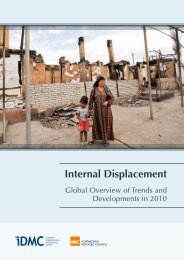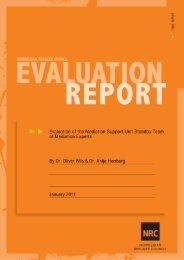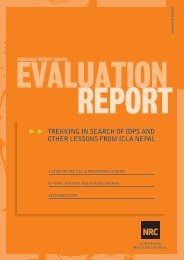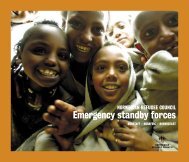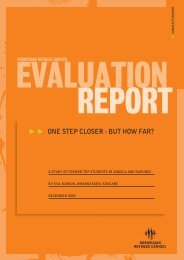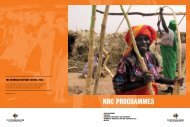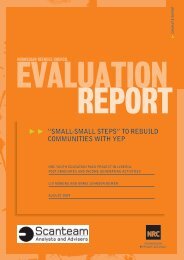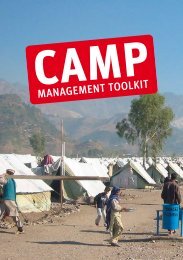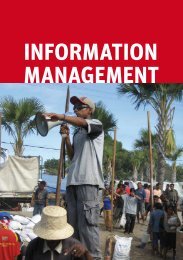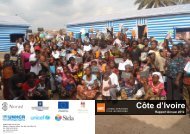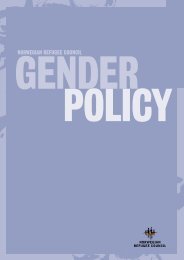evaluation of general food distribution in northern uganda: gulu ...
evaluation of general food distribution in northern uganda: gulu ...
evaluation of general food distribution in northern uganda: gulu ...
Create successful ePaper yourself
Turn your PDF publications into a flip-book with our unique Google optimized e-Paper software.
10 YEARS OF FOOD AID - IMPACTTen years s<strong>in</strong>ce it was started, NRC‘s GFD has had considerable impact on the conflict -affected communities <strong>in</strong> the Acholi sub region, some more positive than others. Asmentioned <strong>in</strong> chapter 4.1., the GFD project has identified <strong>in</strong>dicators to measure thequantitative impact <strong>of</strong> its activities. Weekly, monthly and quarterly monitor<strong>in</strong>g as well as post<strong>distribution</strong> monitor<strong>in</strong>g is carried out. In as much as hav<strong>in</strong>g acknowledged the effectiveness<strong>of</strong> the GFD project and concluded that it has contributed to keep<strong>in</strong>g roughly half <strong>of</strong> the IDPpopulation alive <strong>in</strong> Northern Uganda, the GFD project has had other significant effects.10.1 Women’s Empowerment/Crisis <strong>of</strong> Mascul<strong>in</strong>ityThe methods employed dur<strong>in</strong>g the <strong>distribution</strong> <strong>of</strong> <strong>food</strong> aid have not only given the IDPs somelevel <strong>of</strong> autonomy through their <strong>in</strong>creased participation <strong>in</strong> the <strong>distribution</strong> process, it has alsocontributed to women’s empowerment. Half <strong>of</strong> the member <strong>of</strong> the <strong>food</strong> <strong>distribution</strong> committeemust be women and this has created leade rship opportunities for women <strong>in</strong> a society whereleadership positions were traditionally held by men. This has led to a positive change <strong>in</strong> theattitude <strong>of</strong> the people towards women embrac<strong>in</strong>g leadership 173 . Accord<strong>in</strong>g to some FMCmembers, the presence <strong>of</strong> the women on the committee has <strong>in</strong>fused gender sensitivity andparticularly <strong>in</strong> the resolution <strong>of</strong> domestic conflicts aris<strong>in</strong>g from <strong>food</strong>. The partner with custody<strong>of</strong> the children (mostly women) manages <strong>food</strong> issues. 174 The reverse side <strong>of</strong> the story hasbeen the <strong>in</strong>creased workload for women. More than 60% <strong>of</strong> people who come to pick therations are women, as men have tended to keep away altogether.As the registered recipients <strong>of</strong> <strong>food</strong> aid – women have acquired greater decision-mak<strong>in</strong>gpower <strong>in</strong> the household over how and when <strong>food</strong> utilized 175 and have become the de factobreadw<strong>in</strong>ners – a position that was prior to the conflict held by the men. “Men have noth<strong>in</strong>gunlike <strong>in</strong> the past when they had <strong>food</strong>”. 176 Deal<strong>in</strong>g with these changes and the frustrationsthat come with conf<strong>in</strong>ement <strong>in</strong> the camps has not been easy for the men, a good number <strong>of</strong>whom have resorted to alcohol trigger<strong>in</strong>g a cycle <strong>of</strong> social problems - domestic violence,alcoholism and family break ups 177 . See, also recommendations for household survey <strong>of</strong>changes <strong>in</strong> gender dynamics <strong>in</strong> Section 7.3.10.2 Skills Transfer/EmploymentTo facilitate the <strong>distribution</strong> <strong>of</strong> <strong>food</strong> commodities, NRC has recruited over 200 volunteers whohave been tra<strong>in</strong>ed and equipped with a variety <strong>of</strong> skills <strong>in</strong>clu d<strong>in</strong>g (leadership, management,mobilization etc). Moreover, others have been employed by the organization to manage the<strong>food</strong> <strong>distribution</strong> programme. Community members serv<strong>in</strong>g on the FMCs have also beenequipped with basic management skills. In addition to creat<strong>in</strong>g employment, <strong>in</strong>come andleadership opportunities for the <strong>in</strong>dividuals <strong>in</strong>volved, the programme has created a pool <strong>of</strong>dedicated and skilled personnel <strong>in</strong> the Acholi sub -region: a resource for future developments<strong>in</strong> the region. See recommendations on utilis<strong>in</strong>g this resource base <strong>in</strong> Section 6.6 and <strong>in</strong>Section 9.5.10.3 Dependency SyndromeIt is debatable to what extent <strong>food</strong> aid has created dependency among the IDP commu nities<strong>in</strong> <strong>northern</strong> Uganda. There are those who hold the view that <strong>food</strong> aid has created173Quarterly Report Jan – March 2008, FFL/FFE174FGD with FMCs <strong>in</strong> Amuru IDP camp175Quarterly Report Jan – March 2008, FFL/FFE176Male IDP, Amuru IDP camp177FGDs with IDPs <strong>in</strong> Pawidi and Amuru50




